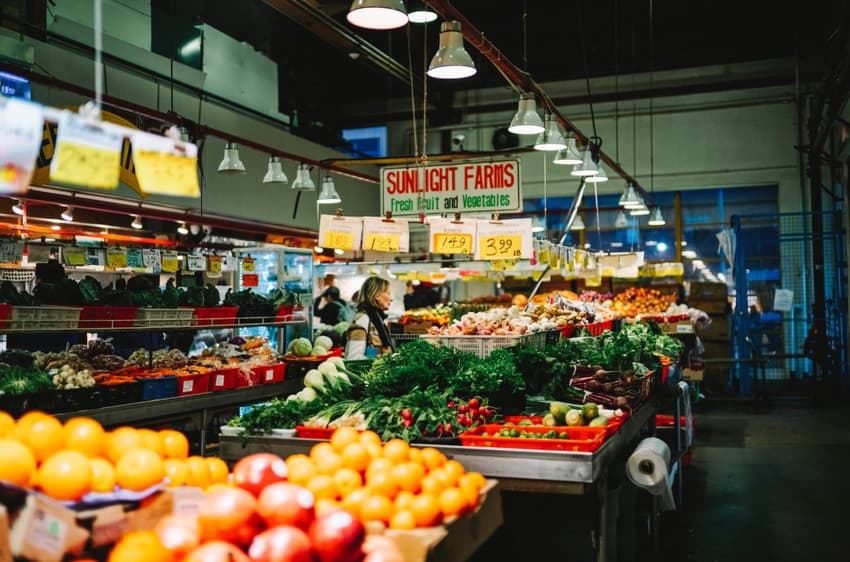How long could price competition in the supermarket sector in Norway last?

Intense price competition since February has helped keep supermarket prices in Norway lower than expected. But how long will it be until prices rise again?
There are two windows where supermarkets in Norway raise prices wholesale. One of these is in February.
Given that food prices have been highlighted as one of the main contributors to inflation in Norway and supermarkets warning of sharp increases in the run-up to February, many were surprised when Kiwi chose to lock prices on a large number of goods.
This forced the other biggest chains in Norway, Rema 1000 and Coop Extra, to follow suit and reverse the price hikes they had introduced.
The run-up to Easter has also seen supermarkets intensify competition on prices of a number of popular seasonal products.
Still, chains may eventually have to relent and bring prices back up.
Coop has warned that it is currently in a pinch between "losing money now or losing customers permanently".
The reason for this is partially due to there being little competition in the Norwegian market. There are three leading operators. These are Norgesgruppen, which owns Kiwi , Meny, Joker, and Spar, Coop and Rema 1000.
Norgesgruppen has a 44 percent share of the supermarket industry, according to the Norwegian newspaper VG.
This larger share allows Norgesgruppen to secure better prices from suppliers, meaning lower prices don't eat into profit margins as much as for Rema 1000 and Coop.
Essentially this means that Norgesgruppen and Kiwi can afford to keep prices lower and for longer than its competitors.
"Now it becomes clear in plain text how demanding it is for us compared to Norgesgruppen and their purchasing conditions," communications director Bjørn Takle Friis told E24 in February.
Supermarkets are next expected to raise prices wholesale in July. Kiwi is once again expected to set the price agenda. The chain could move to raise prices to increase margins. It will also need to increase prices if its suppliers hike prices too.
Should Kiwi raise prices, then the other chains will follow suit. The chains will balance trying not to lose customers to cheaper alternatives and maintaining profitably.
Norway's Consumer Council has welcomed the increased competition. Beate Berrefjord has said that chains can afford to compete on price for the time being as their profitability comes from the volume of customers they have.
"What we have seen in recent months are tendencies towards increased competition between the three chains, all of which are large players that make large profits. … When you have such an insanely high volume, you don't need such high margins. It is still possible to make good money on groceries in Norway," she told E24.
This desire to retain customers may mean that inevitable price rises in Norway are kept in check.
Comments
See Also
There are two windows where supermarkets in Norway raise prices wholesale. One of these is in February.
Given that food prices have been highlighted as one of the main contributors to inflation in Norway and supermarkets warning of sharp increases in the run-up to February, many were surprised when Kiwi chose to lock prices on a large number of goods.
This forced the other biggest chains in Norway, Rema 1000 and Coop Extra, to follow suit and reverse the price hikes they had introduced.
The run-up to Easter has also seen supermarkets intensify competition on prices of a number of popular seasonal products.
Still, chains may eventually have to relent and bring prices back up.
Coop has warned that it is currently in a pinch between "losing money now or losing customers permanently".
The reason for this is partially due to there being little competition in the Norwegian market. There are three leading operators. These are Norgesgruppen, which owns Kiwi , Meny, Joker, and Spar, Coop and Rema 1000.
Norgesgruppen has a 44 percent share of the supermarket industry, according to the Norwegian newspaper VG.
This larger share allows Norgesgruppen to secure better prices from suppliers, meaning lower prices don't eat into profit margins as much as for Rema 1000 and Coop.
Essentially this means that Norgesgruppen and Kiwi can afford to keep prices lower and for longer than its competitors.
"Now it becomes clear in plain text how demanding it is for us compared to Norgesgruppen and their purchasing conditions," communications director Bjørn Takle Friis told E24 in February.
Supermarkets are next expected to raise prices wholesale in July. Kiwi is once again expected to set the price agenda. The chain could move to raise prices to increase margins. It will also need to increase prices if its suppliers hike prices too.
Should Kiwi raise prices, then the other chains will follow suit. The chains will balance trying not to lose customers to cheaper alternatives and maintaining profitably.
Norway's Consumer Council has welcomed the increased competition. Beate Berrefjord has said that chains can afford to compete on price for the time being as their profitability comes from the volume of customers they have.
"What we have seen in recent months are tendencies towards increased competition between the three chains, all of which are large players that make large profits. … When you have such an insanely high volume, you don't need such high margins. It is still possible to make good money on groceries in Norway," she told E24.
This desire to retain customers may mean that inevitable price rises in Norway are kept in check.
Join the conversation in our comments section below. Share your own views and experience and if you have a question or suggestion for our journalists then email us at [email protected].
Please keep comments civil, constructive and on topic – and make sure to read our terms of use before getting involved.
Please log in here to leave a comment.